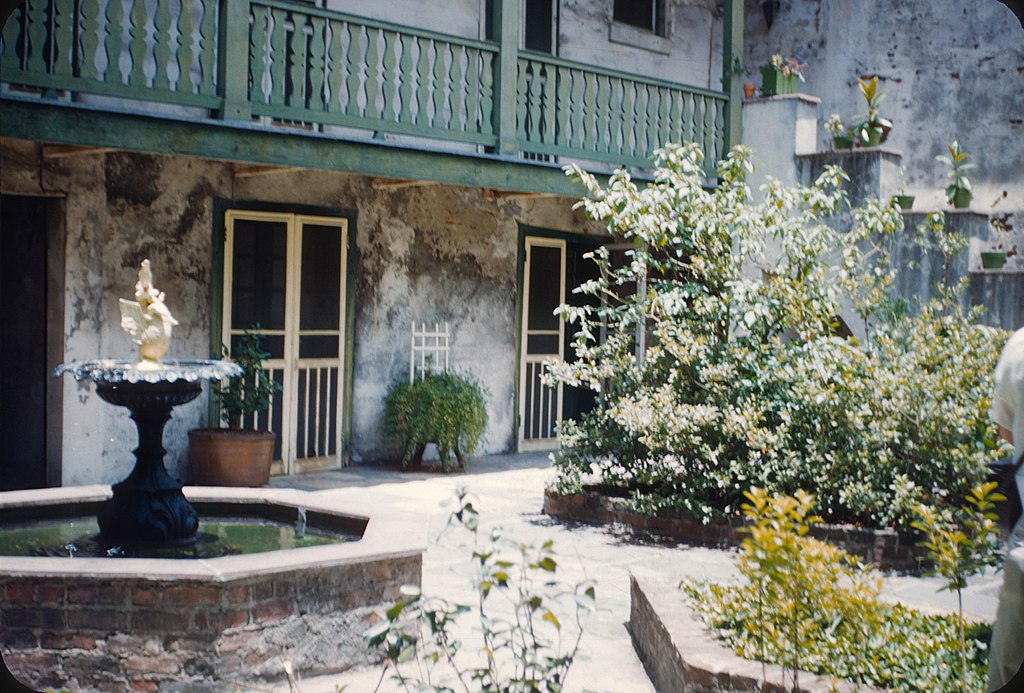
New Orleans, 1958. Licensed under CC0 4.0.
In our new Fall issue, no. 241, we published Nancy Lemann’s “Diary of Remorse.” To mark the occasion, we asked writers to reflect on Lemann’s remarkable literary career.
In the early years of the revived Vanity Fair, I happened to be in Tina Brown’s office when the conversation turned to a dispatch Nancy Lemann had just filed from the trial of Louisiana governor Edwin Edwards, which Nancy, a child of New Orleans, was covering for the magazine. Tina was dissatisfied, borderline exasperated: Nowhere in the article, she complained, did Nancy specify what the trial was about, what the actual charges were, and what the criminal penalties might be; it was all mood, séance atmosphere, and sketch artistry. This was not journalism as we knew it in the halls of Condé Nast. “I’ll talk to Nancy and get her to work all this in up front,” said Pat Towers, Nancy’s editor. In Towers’s comment, I caught an echo of something I once heard Nancy sigh aloud about: an editor’s suggestions regarding her latest novel manuscript, primarily its lack of story. “I guess I’ll have to go back and put in some plot,” Nancy had said—but of course you can’t retroactively implant a plot into a body of fiction as if installing a new transmission.
Starting with her first novel, Lives of the Saints, Nancy Lemann has spread her impressions across the page in a style that calls to mind smooth, panning camera shots. Lives of the Saints, Sportsman’s Paradise, The Fiery Pantheon, Malaise (what a title, so Françoise Sagan): they’re like pre-mumblecore movies with a more interesting ensemble of neurotics, a firmer point of view, and a shapelier sense of comedy. No Lemann scene is complete without several characters in various stages of disrepair or subtle agitation, in need of flotation devices to get through the day. Although Nancy was a protégé of Gordon Lish, Elizabeth Hardwick, and Walker Percy—a heady triad of influences and personality-pluses that might have easily overloaded her circuits—her literary voice from the outset was assuredly, distinctively hers. In temperament and sensibility, she seems to me closer to F. Scott Fitzgerald than any of her mentors—or perhaps she’s Scott and Zelda rolled into one, her work suffused with a longing for a lost glamour. And she has no imitators.
Unlike Scott and Zelda, though, Nancy and her autobiographical stand-ins are interested in comfort rather than luxury; they’re bohemian romantics with a fondness for familiar haunts and a taste for the shabby-genteel. I once made the mistake of chaperoning Nancy to CBGB, and as soon as she stepped through its grotty portal I sensed an inner freeze: punk was beyond the pale. For Nancy, bohemia was a blue-lit lounge leafed with fake palm trees, or a private social club where white-haired gents in rumpled seersucker beam benignly upon younger folks making tiny spectacles of themselves.
Of all of her unjustly neglected books—none of them even available on Kindle, what gives?—The Ritz of the Bayou is the greatest. Lavishly described on the front cover as “the New Orleans adventures of a young novelist covering the trials of the Governor of Louisiana, with digressions on smoldering nightclubs, jazz-crazed bars, and other aspects of life in the tropic zone,” it possesses all the signature traits of her fiction—the rueful humor and wry asides, the sentences that unfurl like scarves from a magician’s sleeve, the damp moss of history underfoot in the present, the faded gallantry of good manners—with a larger probe of social anatomy and institutional drift. Its publication was a beau geste by Gordon Lish and Knopf; this fugue performance of personal reporting on a complicated trial with a mostly obscure cast of lawyers, reporters, local notorieties, and assorted eccentrics had no chance of commercial success. Nor did it attract the critical notice and fervent cult that sustain Lives of the Saints.
In The Ritz of the Bayou, Nancy included all of the factual necessities that Towers found lacking in the piece she had been writing for Vanity Fair, but it’s not only as a work of journalism that the book deserves better than it got and gets. It reveals Nancy Lemann as an unrivaled, unlicensed detective in the art of “reading the room.” As soon as our correspondent takes her first gander at the courtroom, she knows she is where she is destined to be: “My heart was back in business when I saw all that human frailty.” Like the hedonistic governor in the defendant’s chair, she is loath to moralize and scold, musing, “Politics is not the place to look for saints. It’s not exactly the blue vault of heaven there, in politics.” Some of her other deadpan ironies are positively Murray Kemptonish: “The Prosecutor was not winning when he moralized about the Governor, who is known for gambling, womanizing, and risqué bon mots, for people hold few things as dear as those.” As the trial drags on, further delayed by the latest hurricane to barge in, entropy and brain fatigue take hold and morale unravels: “The jurors were beginning to fall to pieces.” Following a mistrial, the governor is retried, and the second jury pool is an even sorrier lot than the first (“The excuses were more lame than ever … ‘I’m constipated,’ ” et cetera). But somehow the judicial process proceeds on its rickety course, and the governor is acquitted—a strangely anticlimactic result, but somehow fitting for the endless soap opera that is Louisiana corruption, in which a new episode always awaits. Having no further vibes to harvest on this expedition, Nancy Lemann, Girl Reporter, bids a weary adieu, “for my days in politics are over.”
from The Paris Review https://ift.tt/VLh1OHq
Comments
Post a Comment